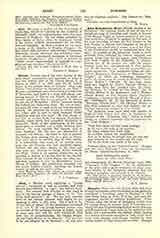

Alma, a Hebrew word signifying a “young woman”, unmarried as well as married, and thus distinct from Bethulah, “a virgin” (see Hebrew Lexicons). The interest that attaches to this word is due to the famous passage of Isaias, vii, 14: “the Alma shall conceive”, etc. We can only mention some of the various opinions with regard to the meaning of Alma in this verse. She is said to be, (I) the wife of Achaz; (2) the prophetess mentioned in Is., viii, 3; (3) any young married woman, who on account of the promised victory of Judah, could at some near date call her child Immanuel (God with us); (4) metaphorically, the Chosen People; (5) the Virgin Mother of the Messiah. This last view is the one adopted by St. Matthew, i, 23, and after him by Christian tradition.
R. BUTIN

